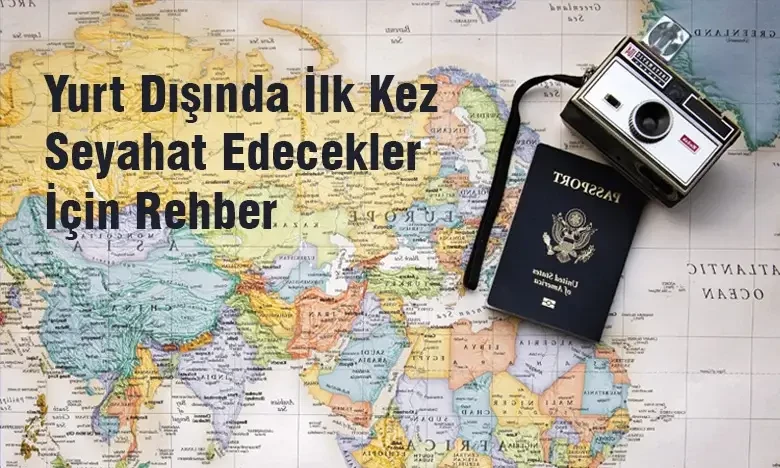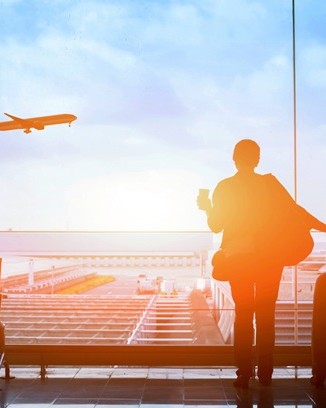So, what should you do to best prepare for this unique experience? You can learn all the details with this international travel guide we have prepared for you. If you are ready, get your passports and start enjoying your first trip!
1. Start Planning Your Trip Early
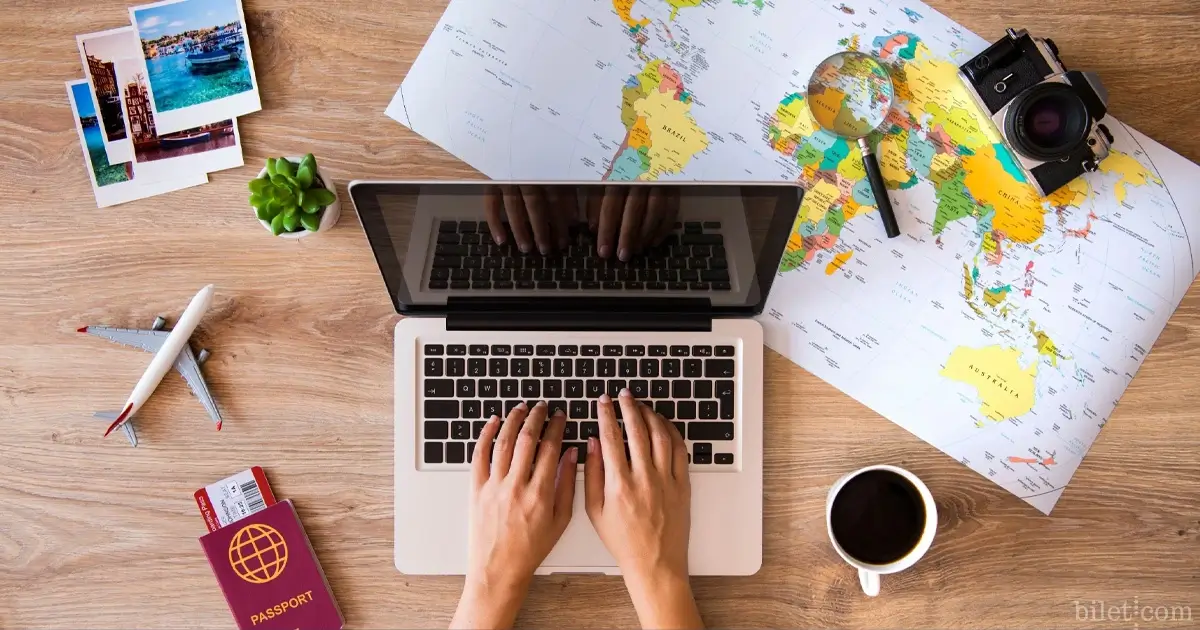
Don’t be intimidated by going abroad for the first time, you can shape your process with proper planning. Good planning prevents the difficulties you may encounter and allows you to enjoy every moment of your trip. By starting early, you can save time and take control of every detail.
Research Your Destination
- Climate : Research the climate conditions in advance. Prepare clothing and accessories appropriate for the weather conditions on your travel date. If you are going to a tropical country, bring light clothing, and if you are going to a cold region, bring clothes that you can wear in layers.
- Culture : Learn about the culture and customs of the country. Learn about the social norms that you should pay attention to, especially in the places you will be visiting. For example, in some countries, dress codes or behavioral patterns may be very important.
- Popular places : Discover popular tourist attractions and activities you can do. You can plan your days more efficiently by making a list of places to visit.
- Food : Research the food culture of the country and determine the flavors you can try in advance. This will increase the excitement of trying new flavors.
- Language : Familiarize yourself with the basics or at least a few common phrases. Learning a few simple words can make it easier to communicate with locals and help you build a close bond with them.
Visa and Passport Procedures
One of the most critical stages of your travel is to prepare your official documents completely. Passport and visa procedures are of great importance for your travels.- Passport : Check your passport expiration date. Many countries require your passport to be valid for at least 6 months after your trip ends. If it's about to expire, start getting a new passport early.
- Visa : Research the visa requirements of the country you are going to. While some countries offer visa-free entry, others may require quite detailed application processes. Prepare the required documents for the application, fill out the application form carefully and apply early, considering the processing time.
2. Make Flight and Accommodation Reservations
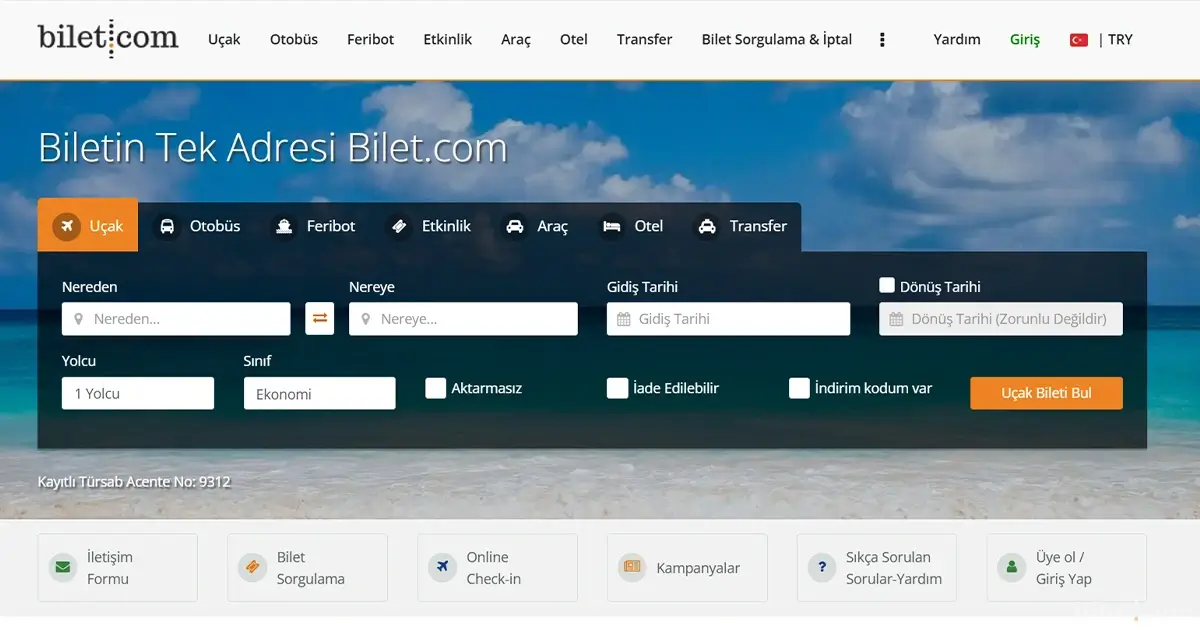
As the cornerstones of your trip, transportation and accommodation are one of the most important parts of planning. Booking early will not only help you stay within your budget but also make your travel experience more stress-free.
How to Find the Most Affordable Flight Ticket?
The secret to finding affordable flight tickets is to find the right time and the right platform. Here are the tips for finding an affordable flight ticket:- You can buy your flight ticket comparatively via Bilet.com. It offers you the best prices with its user-friendly interface, various airline options and regular campaigns. Also, don't forget to follow last minute deals and early booking advantages.
- With the flexible date option, you can easily find tickets that fit your budget. For example, weekday flights or morning flights are usually more affordable. A little flexibility in your travel dates can save you a lot of money.
- Search for flights in incognito mode. Some booking sites may increase prices for repeat searches. Use incognito mode to see the most accurate prices.
Check out our accommodation options
Accommodation is one of the most critical points of your trip. You should choose the right place to feel safe and comfortable:- Trusted sites : Compare hotel options using trusted booking sites. User reviews and ratings can help you get an idea of where to stay. Especially if you are traveling abroad for the first time, choose accommodations with high ratings and positive reviews.
- Location : Consider staying closer to the city center. This will reduce public transportation costs and provide easy access to the city’s major landmarks. Also, hotels in tourist-friendly areas may be better equipped to overcome language barriers and meet your needs.
- Different accommodation options : Consider alternative accommodation options. Hostels, home rental platforms like Airbnb, or boutique hotels can offer both affordable and different experiences. But no matter where you stay, check the details carefully before booking.
- Book early : Take advantage of early booking opportunities. Especially during popular travel periods, prices can increase rapidly. By acting early, you can protect your budget and have more options.
3. Don't Forget to Get Your Travel Insurance
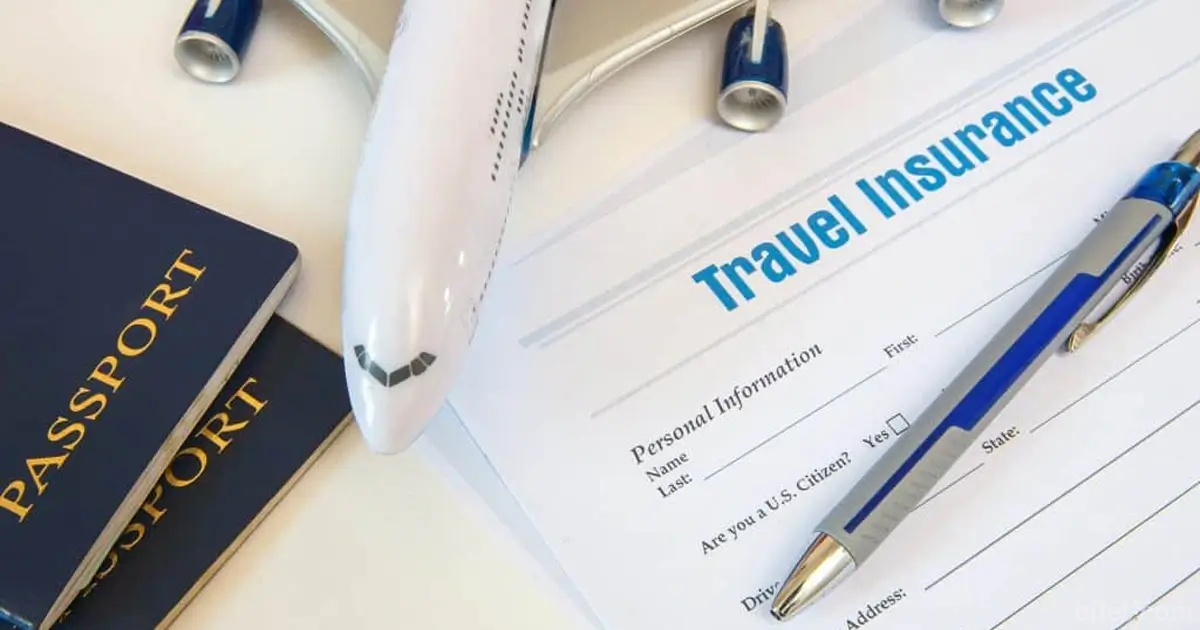
Travel insurance is a must for international travel. While you are filled with the excitement of discovering a new country, never forget to get insurance to feel safe in an unexpected situation. Remember that you can easily get travel insurance for all tickets you buy from Bilet.com !
Why Is Travel Insurance Important?
- Health issues : Any health issues that may arise during your trip can be quite costly, especially abroad. Travel insurance comes into play to cover emergency medical interventions, hospital bills and medication expenses.
- Luggage loss and delay : Luggage lost or delayed at airports can make the beginning of your trip difficult. An insurance policy provides a solution by covering your losses in such cases.
- Flight cancellations and delays : Travel insurance can compensate you for financial losses in case of flight cancellations or delays that may affect your plans.
- Loss of passport : In case of passport loss, which is one of the most stressful situations abroad, insurance provides immediate support and guidance.
What Should You Pay Attention to When Getting Travel Insurance?
- Check the coverage : Carefully examine what the insurance covers. For example, if you plan to do extreme sports, make sure you choose a policy that covers those types of activities.
- Validity period : Make sure your insurance is valid from the start of your trip until your return date. If you need longer coverage, you can add this to your policy.
- Emergency support line : Make sure your insurance company offers a 24/7 emergency support line. This makes it easier to get help quickly abroad.
- Price-value ratio : Compare the cost of the policy with the benefits it offers and find an option that suits your budget and is sufficient.
4. Packing Tips
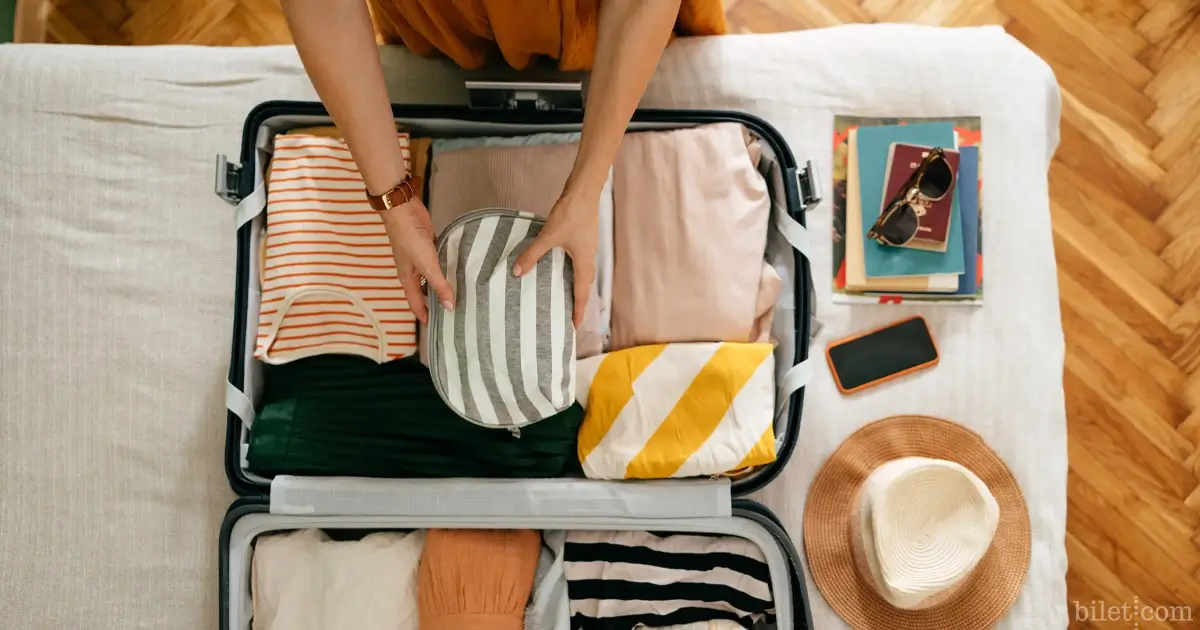
It is very important to pack the right suitcase for your trip abroad. Taking everything you need with you without carrying too much stuff will make your trip more comfortable and stress-free. Here are some tips to consider when packing your suitcase:
Buy Items Suitable for the Country You Are Going to
- Weather : Choose clothes that are appropriate for the climate of the country you are going to. If you are traveling to a tropical region, choose light, comfortable and breathable fabrics. If you are going to a colder climate, prepare clothes that will allow you to dress in layers.
- Multi-purpose clothes : You can save space in your suitcase by choosing clothes that you can combine with different things.
- Travel-sized personal care products : You can save space and avoid airport liquid restrictions by opting for travel-sized products like shampoo, toothpaste, and facial cleanser.
- Electronics and accessories : Don't forget your basic needs like phones, chargers, headphones, etc. If you're going to a country that uses a different type of socket, bring a plug adapter with you.
Documents You Need to Take With You
Documents are one of the most important parts of your trip and preparing them in an organized manner will make things much easier for you:- Documents : Make sure to take your basic documents such as passport, visa, plane ticket, hotel reservation and travel insurance documents with you. Make photocopies of these documents and place one copy in your suitcase and one copy in your handbag.
- Make digital copies : Upload all your documents to your phone or a reliable cloud system (like Google Drive, iCloud). This way, you can access your documents at any time and easily access them in case they are lost.
- Identity and financial documents : Don't forget to bring your ID card, an international driver's license if you have one, and any bank cards you plan to use during your trip.
Extra Tips
- Pack an “emergency kit” : Pack some basic health supplies like painkillers, stomach medicine, and bandages.
- Leave some space : Don't forget to leave some space in your suitcase for souvenirs or shopping you will pick up at your destination.
- Get a lightweight but durable handbag : A handbag that you can use to carry your passport, wallet, phone and other important items will come in handy, especially on a plane trip.
5. Communicating in a Foreign Country

Communicating effectively in a foreign country will make your trip both enjoyable and hassle-free. Especially if this is your first time abroad, overcoming the language barrier and providing the necessary infrastructure for communication will make your life easier.
Methods to Overcome Language Barriers
The language barrier is a common challenge that many travelers face, but with a few simple preparations, you can easily overcome this obstacle:- Mobile apps : You can quickly learn basic expressions with language learning apps like Duolingo, Babbel, Memrise. You can also translate even if you don't have an internet connection thanks to Google Translate's offline feature. You can also translate signs and texts using your camera with Google Translate.
- Basic phrases : Learning common phrases in the local language of the country you are going to, such as “hello,” “please,” “thank you,” and “can you help me?” will make communication easier. Locals usually appreciate foreigners’ efforts to learn the language and will approach you more cordially.
- Body language : Body language is a universal tool when communicating. You can easily convey your message to the other party by using gestures and facial expressions.
- Business cards or address notes : Print the addresses of hotels or important places you will be visiting in the local language and carry them with you. These notes will make your job easier when communicating with taxi drivers or locals.
Internet and Phone Usage
Staying connected while abroad is critical for both communication and navigation. Here are some steps you can take:- International phone plans : You can get a cost-effective international phone plan for the length of time you plan to travel. Check your carrier's international plans ahead of time.
- Get a local SIM card : If your trip is going to be long, you can buy a local SIM card in the country you are going to. This provides a cheap solution for both internet access and phone calls.
- Find free Wi-Fi hotspots : Airports, cafes, restaurants, and hotels often offer free Wi-Fi. However, you may want to consider using a VPN app to keep yourself safe when using public Wi-Fi networks.
- Navigation apps : Download apps like Google Maps or Maps.me onto your device beforehand. These apps have offline map options that can help you navigate without an internet connection.
Extra Tips
- Voice translation devices : Portable translation devices provide effective communication by translating in real time.
- Be patient : Language differences can sometimes lead to misunderstandings. Communicating with a smile and understanding will increase the other party's willingness to help you.
6. Resolve Financial Issues In Advance

Planning ahead for financial matters when traveling abroad prevents unexpected disruptions and makes your trip go more smoothly. Considering every detail, from currency exchange to budget planning, makes it easier to enjoy your trip.
Currency Exchange and Card Usage
- Choosing the right credit card : Choose a credit card that offers low commission rates and advantageous exchange rates for your overseas spending. Also, make sure your card is open to overseas shopping and ATM transactions.
- Need for cash : Learn the currency of the country you are going to and carry a small amount of cash. You may need cash, especially for taxis, small shops or tips. Exchange currency at banks or reliable exchange offices, which usually offer more advantageous rates.
- Using an ATM : Withdrawing local currency from an ATM abroad may offer a more advantageous rate than currency exchanges. However, check your bank's international transaction fees beforehand.
- Digital payment methods : Digital payment methods such as Apple Pay, Google Pay or PayPal offer a fast and secure payment alternative abroad.
Plan Your Budget
- Category-based budget : Allocate a specific budget for categories like food, transportation, accommodation, souvenirs, and entertainment. This will help you keep your expenses under control.
- Extra expenses : Don't forget to add extra money to your budget for unexpected situations or moments when you might want to pamper yourself.
- Mobile apps : You can use mobile apps like Trail Wallet, TravelSpend, or Spendee to organize your travel budget and track your expenses.
- Avoid unnecessary spending : Prices can often be higher in tourist areas. Restaurants and markets favored by locals offer an affordable and authentic experience.
7. Be Prepared for Cultural Differences

Every country you travel to is shaped by its own unique traditions, rules, and social norms. In order to have a successful experience abroad, it is important to understand and respect these differences. Here are some important points to consider when looking at different cultures:
Tipping Habits
- Tipping traditions of different countries : Tipping is mandatory in some countries, while it is voluntary in others. For example, in the United States, it is common to leave a tip of 15-20% in restaurants, while in some European countries, this amount may be included in the bill.
- Countries to watch out for : Tipping is not customary in Japan and can sometimes be perceived as disrespectful. However, in some of the more touristy areas, it can be common to thank people for giving a tip.
- Local practices : You can avoid unnecessary misunderstandings by researching the tipping habits of the place you are visiting.
Clothing
- Local dress customs : In some cultures, clothing style is of great importance. Especially when visiting sacred places such as religious sites and temples, it may be necessary to dress modestly and modestly to show respect.
- Dressing according to the climate : Dressing according to the climate of the place you are going to will not only keep you comfortable but also help you comply with the cultural norms of the local people.
- Clothing recommendations for special occasions : For example, while a more conservative style of clothing is common in the Middle East, comfortable and free clothing may be preferred in some parts of Europe.
Social Norms of Local People
- Tone of voice and speaking style : In some cultures, speaking loudly can be perceived as rude. In some parts of Asia and Europe in particular, a low and calm tone of voice is preferred.
- Gestures and facial expressions : Body language has different meanings in every culture. For example, shaking your head in South Korea means “no,” while in the Western world this gesture is usually used to indicate approval. You can avoid misunderstandings by using your gestures carefully abroad.
- Social distancing : In some countries, people prefer to speak at a closer distance, while in others it may be important to respect personal space. Following local social norms increases mutual understanding and respect.
9. Don't Forget to Enjoy Your Travel!
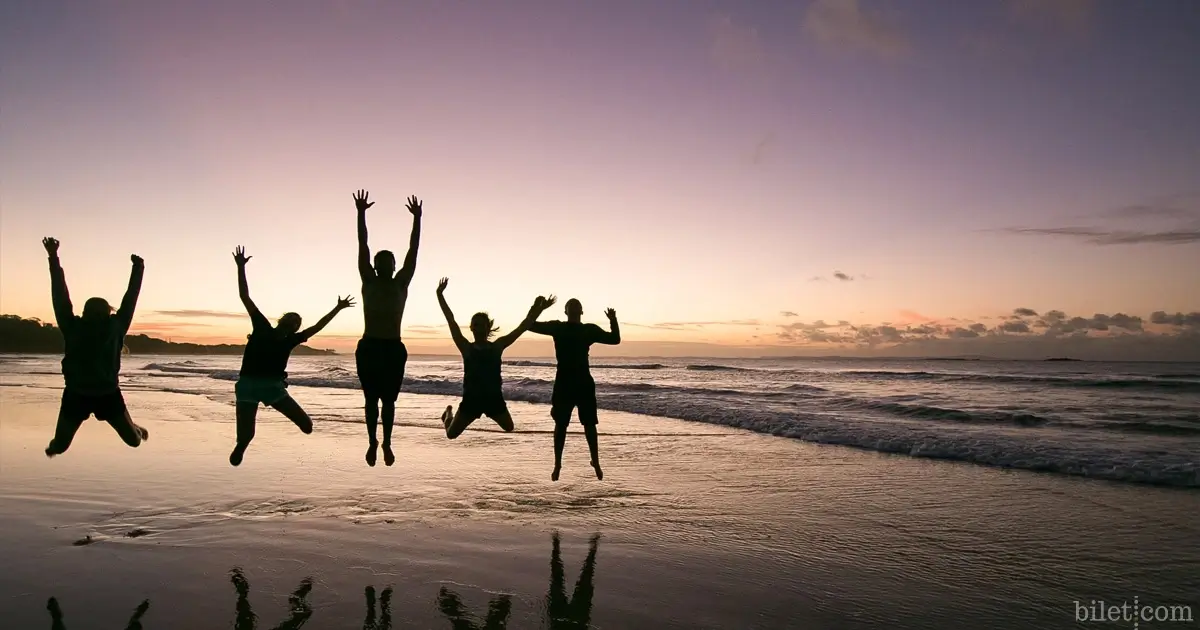
Your first trip abroad will be an unforgettable experience in your life. It is not only a chance to see new places, but also to learn about different cultures, gain new perspectives and grow as a person. Enjoy everything on your trip. Respect local traditions, observe people's lifestyles and discover new flavors. This will increase the pleasure of both discovering a new country and immersing yourself in a different culture.
Instead of seeing your trip as just a trip, consider it as an experience. Taking lots of photos and capturing memories is important during this process, but it is also just as valuable to directly feel the beauty and life around you. Enjoying a new place means not only visiting the touristic places you planned, but also discovering the small moments in daily life. Relax, explore and enjoy every moment during your trip.
